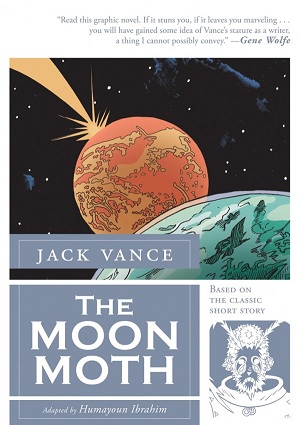
Tom Spurgeon recommends the comics adaptation of Jack Vance’s short story The Moon Moth
This has to be the oddest stand-alone science fiction comic I’ve read in years. While I can’t tell yet how good it is, it was certainly memorable and I encourage those of you that like such things — and as much as the new science fiction-oriented Image stuff is on everyone’s minds I’m thinking that’s a lot of you — pick this one up and take a look. Jack Vance has an almost Kirby-sized issue with neglect in terms of his influence and the ubiquity of his approach.
Interesting to compare Vance to Kirby, where I can sort of see what Tom means as both were incredibly influential on their own terms and somewhat neglected now, though I do think Vance does not quite have the stature in science fiction that Kirby has in comics, if only because the field is more contested. The true difference between the two is of course that Vance got to keep the copyright and trademarks for all his stories and Kirby could not, which means that we did get a fan driven Vance Integral Edition, but not a Kirby equivalent.